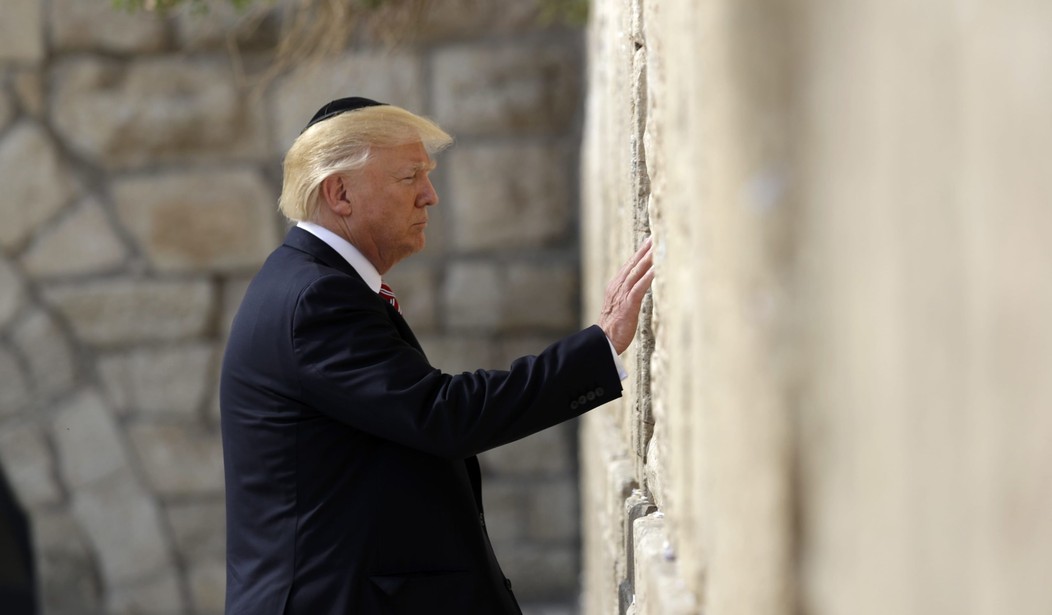On Monday, at President Donald Trump’s direction, the U.S. Embassy in Jerusalem opened its doors to great fanfare, fulfilling a long-term promise made by numerous U.S. presidents and supported by a vast majority of Congress in 1993. The move proved popular among Israeli Jews as well, according to a new poll.
A full 93 percent of Israeli Jews support the move of the U.S. Embassy to Jerusalem. Nearly three-quarters (73 percent) of them said they support not only moving the embassy, but doing so now. Another 20 percent said they support the move, but disagree with the timing. They suggested Trump should have waited until he unveiled his plan for ending the Israeli-Palestinian conflict.
Support for the embassy move and the timing ran highest among Israeli Jews who identified as “national religious” (89 percent) as opposed to Haredi (77 percent), traditional (84 percent), or secular (60 percent). Secular Israeli Jews proved most likely to disagree with the timing (30 percent) and most likely to disagree with the move overall (8 percent).
This agreement is quite remarkable because Israeli Jews are not nearly as monolithic as some might think. “Perhaps it doesn’t seem surprising that Israeli Jews would agree on this matter. But in fact, they are a group deeply divided on many domestic and foreign policy issues, including the path forward on Palestinian relations,” Shibley Telhami, a professor at the University of Maryland who directed the center behind the poll, wrote in a Politico report about the poll.
Telhami argued that “since Jerusalem has both religious and political significance, one would expect variations across the religious/secular divide within Judaism. On the embassy issue, however, Jewish Israelis seem to have banded together to support Trump’s move—to the point that they also strongly support the U.S. president himself, in contrast with most Americans and indeed most people around the world, who hold unfavorable views of Trump.”
Indeed, 59 percent of Israeli Jews reported having a “favorable” view of President Donald Trump. Haredi (78 percent), national religious (72 percent), and traditional (69 percent) Jews were even more likely to approve of Trump, while slightly less than half (45 percent) of even secular Jews also approve of the president. Another fifth of Israeli Jews had a neutral opinion, while even fewer (19 percent) saw Trump in a bad light. Secular Jews were most likely to have an “unfavorable” view of the president, at 30 percent.
Trump’s decision to withdraw the U.S. from the Iran nuclear deal may also have boosted his popularity among Israelis, Telhami suggested.
In contrast to the U.S. Embassy move, Israeli Jews proved divided on the issue of Israeli sovereignty over East Jerusalem. Israeli Jews strongly agree that Israel should hav sovereignty over Jewish holy places and the Jewish Quarter of East Jerusalem (83 percent) and the walled old city (74 percent). Only 51 percent agree that Israel should have sovereignty over East Jerusalem’s Arab neighborhoods, however (42 percent disagreed). Most secular Jews (56 percent) disagree.
While evangelical Christians in the U.S. may have pushed Trump to make the embassy shift, Israeli Jews proved rather divided on evangelical Christians. A plurality of them are neutral (43 percent), while about a quarter view evangelicals favorably (26 percent). Less than one-in-five (16 percent) have unfavorable views of evangelicals, and many said they are not familiar with evangelical Christians (14 percent).
Ever since Trump’s announcement about the embassy move, Israelis have thanked him in various ways. Last December, Israel’s transportation minister announced that the train station for the Western Wall will be named after Trump. In remarks this past March, Israeli Prime Minister Benjamin Netanyahu compared President Trump to the ancient Persian King Cyrus the Great and to Lord Balfour, who issued the proclamation establishing the state of Israel.
“I want to tell you that the Jewish people have a long memory. So we remember the proclamation of the great King Cyrus the Great — Persian King,” Netanyahu said. “Twenty-five hundred years ago, he proclaimed that the Jewish exiles in Babylon can come back and rebuild our temple in Jerusalem.”
Palestinian protests broke out around the embassy opening, pushing Israel to use lethal force. While many media outlets have represented these as innocent victims, Israeli officials and various reporters have responded that the “protests” were really terrorist riots organized by Hamas.









Join the conversation as a VIP Member